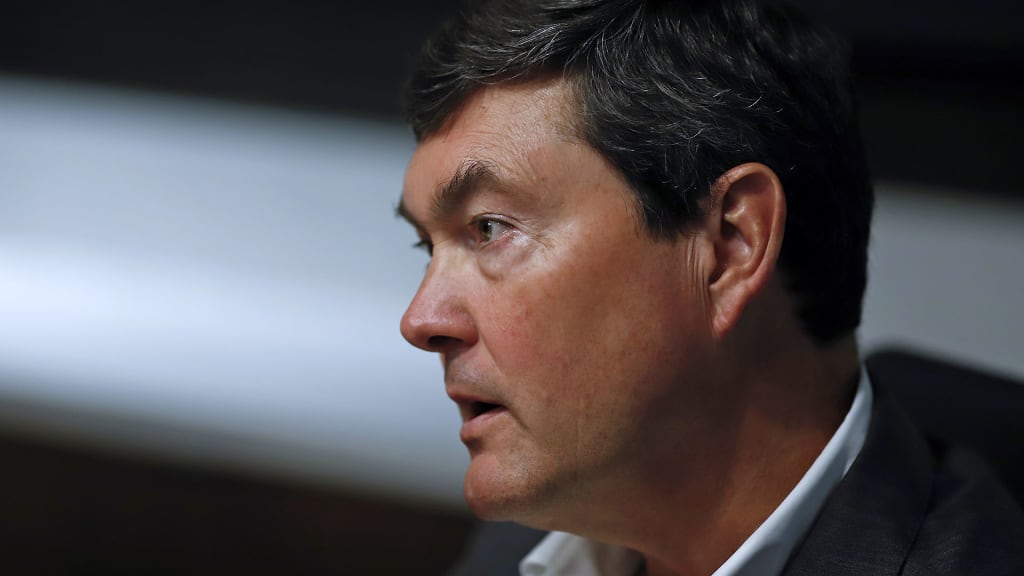
PITTSBURGH -- Bob Nutting sat at the end of a long table inside a glass-walled conference room on the second floor of the Pirates’ offices on Federal Street. To his right was Travis Williams, newly named Pirates president. For more than 30 minutes on Monday afternoon, they fielded questions about the past, present and future of Pittsburgh’s ballclub.
Nutting discussed the dismissal of the Pirates’ previous management trio. Williams talked about his excitement to take on a new role. Here’s a quick look at several important topics they touched on during a chat with the Pittsburgh Post-Gazette and MLB.com.
Is it time to rebuild?
Since 2011, the Pirates have been reluctant to tear down their Major League roster and build it back up again. The strategy worked for the Cubs, Astros and Brewers, among others, but Pittsburgh has insisted the club can contend every season despite its financial limitations. That plan sounded good from 2013-15, but it didn’t pan out from ’16-19.
Will that change now that Frank Coonelly and Neal Huntington are no longer at the helm? Nutting was hesitant to say, but he did not rule it out.
“I think that’s a discussion with the new general manager as we chart that path forward. It is challenging to have continued success and retool at the same time as you’re focused on the field,” Nutting said. “Given where we are, with the some of the young talent in the organization, we’re not in a traditional point in time to blow it up. But I do think we need to have every option on the table. There’s no question we need to have more talent throughout the organization. We have talked about infusing more talent in the organization. We need to live it and breathe it.”
Nutting is correct: The Pirates don’t have the kind of elite talent that would fetch a franchise-altering return on the trade market, and most of their core is under club control for several more years. Starling Marte and Keone Kela might be their most valuable players in that regard, and Josh Bell would surely appeal to American League clubs in search of a power bat. Bryan Reynolds’ value might be too high to find an appropriate deal, and he’ll be around long enough for the Pirates to build a contender around him.
Nutting was correct about something else, too: They need more talent in the organization, however they can get it.
What about payroll?
Nutting and Williams presented a narrative of change in every aspect of their business and baseball operations. But the Pirates have regularly ranked among the lowest-spending teams in the Majors, in terms of Major League payroll, so it’s fair to wonder if that too will change.
When asked if increased attendance last season at PNC Park and the club’s new television deal will impact their spending, Nutting said they’re still discussing the subject. He did allow for the possibility that the Pirates will reallocate their resources, noting that they’ve regularly ranked among the biggest spenders in player development.
Mostly, Nutting pushed back against the idea that the small-market Pirates aren’t spending everything they can.
“I really believe that the fundamental narrative about the economics of the Pittsburgh Pirates and the economics of baseball have been misunderstood. The narrative is not accurate,” Nutting said. “We will never use the economic system as an excuse because that would immediately be defeatist. We’re not going to do that. However, we have to be realistic and communicate more clearly and more directly what those economic challenges that we face are. The idea that we are hoarding cash as a team is simply not accurate. We will find a more compelling and complete way to make sure that that is an issue that simply is not on the table. It is an unnecessary drag, and it’s not an accurate narrative.”
What about the rest of the front office?
The Pirates have only announced a handful of departures: Clint Hurdle, Coonelly, Huntington, pitching coach Ray Searage and bench coach Tom Prince. What about the rest of Huntington’s front office lieutenants? They were still working Monday as Nutting and Williams met the media.
The Pirates will evaluate the remaining executives and, most likely, allow the new GM to fill out the front office staff as he or she sees fit.
Assistant general manager Kevan Graves will serve as interim GM while Williams leads the search for Huntington’s permanent replacement, making the necessary roster moves after the World Series ends. It would make sense to keep a rules-and-regulations expert like Graves around during the transition process, and some within the industry view the 38-year-old Graves as a future GM candidate.
Huntington led the Pirates’ baseball operations department, but it’s little secret that Coonelly was also involved in the decision-making process. Will Williams take on a similar position despite his relative lack of baseball experience? Probably not.
Williams said he’ll surround himself with smart baseball minds while lending “oversight and some checks and balances, if you will, along the lines to make sure that we’re making good, sound decisions for the overall organization.”
What about the manager?
The managerial search has been paused but not reset. Huntington began the process and interviewed candidates, and Nutting considered that to be “groundwork” that will be valuable whenever they hire a new GM to conclude the search.
Williams, who has reached out to the managerial candidates that Huntington interviewed, said the general manager search will come first. After that hire is made, the new GM will select Pittsburgh’s next manager.
“If we had waited until now to begin the search, we would have been behind,” Nutting said. “Very good work has been done with the candidates, good groundwork has been laid.”
What’s the message to fans?
Nutting made the overriding message clear with his words and personnel moves: The last few years, especially this year, were unacceptable. The Pirates expect to be better than they’ve been, particularly when it comes to player development, the lifeblood of the organization.
Nutting said he has heard criticism that he doesn’t care about winning. He addressed that, referencing his desire to experience more nights like the 2013 National League Wild Card Game at PNC Park.
“We need to demonstrate with our actions that we’re going to move forward, demonstrate with our actions that we’re going to put the very best team on the field that we possibly can,” Nutting said. “I’m far more inclined to talk about what we’ve done than what we hope to do. … We’re going to be straightforward. We’re going to be honest. We’re going to tell it like it is. We are going to move forward with the strongest possible team. We want to demonstrate our gratitude to the fans and our commitment to winning at this organization.”
One of Williams’ tasks will be rebuilding trust with fans. He learned long ago that winning is the best way to do so, but he said there’s more to it than that.
“Beyond just pure wins and losses, being competitive -- making sure that people feel that the team is not only competitive, but they actually are out there trying hard, they care, and they want to win for the fans,” Williams said. “They want to be heard. They want to know that we understand they care. They want to know that we’re going to treat them like family.”
